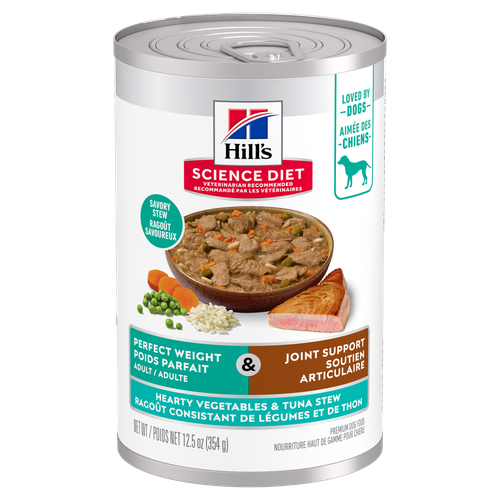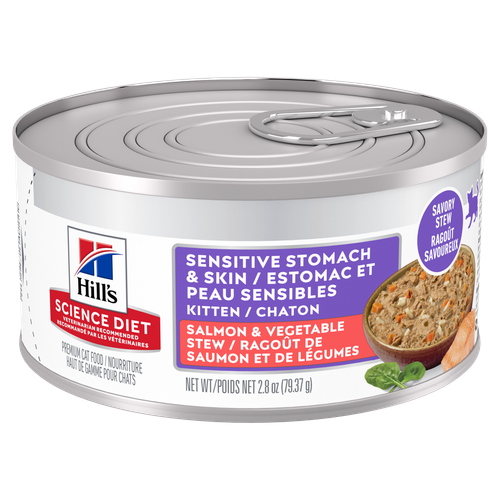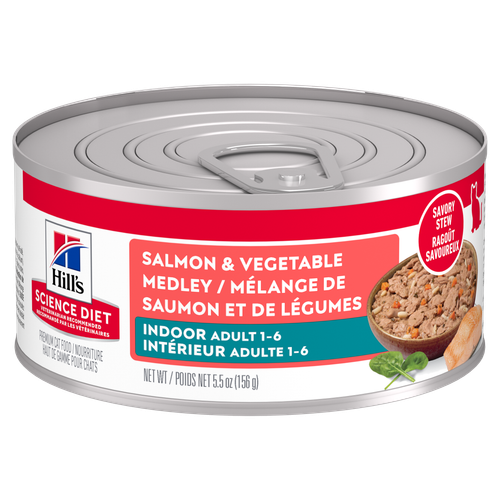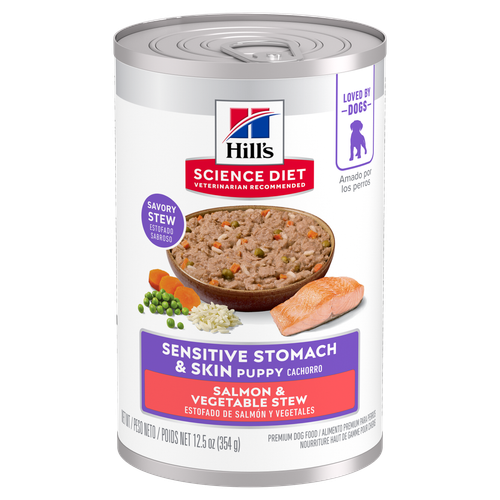
-
Find the right food for your petTake this quiz to see which food may be the best for your furry friend.Find the right food for your petTake this quiz to see which food may be the best for your furry friend.Featured products
 Sensitive Stomach & Skin, assortiment de conserves
Sensitive Stomach & Skin, assortiment de conservesHill's Science Diet Sensitive Stomach & Skin Variety Pack
Shop Now Adult Perfect Weight & Joint Support Hearty Vegetables and Tuna Stew Dog FoodShop Now
Adult Perfect Weight & Joint Support Hearty Vegetables and Tuna Stew Dog FoodShop Now Healthy Cuisine, Adulte, assortiment de conserves
Healthy Cuisine, Adulte, assortiment de conservesHill's Science Diet Healthy Cuisine Variety Pack
Shop NowFeatured products Kitten Sensitive Stomach & Skin Salmon & Vegetable Stew
Kitten Sensitive Stomach & Skin Salmon & Vegetable StewSupports kitten growth, digestive health, nourishes skin and promotes a lustrous fur
Shop Now Adult Urinary Hairball Control Savory Chicken Entrée cat food
Adult Urinary Hairball Control Savory Chicken Entrée cat foodSupports the health of the whole urinary system with optimal levels of magnesium
Shop Now Adult Indoor Salmon & Vegetable Medley Cat Food
Adult Indoor Salmon & Vegetable Medley Cat FoodPrecisely balanced nutrition for indoor cats with the delicious taste of savory salmon and vegetables
Shop Now -
Dog
- Dog Tips & Articles
-
Health Category
- Weight
- Food & Environmental Sensitivities
- Urinary
- Digestive
- Joint
- Kidney
- Dental
- Cancer
-
Life Stage
- Puppy Nutrition
- Adult Nutrition
- Senior Nutrition
Cat- Cat Tips & Articles
-
Health Category
- Weight
- Skin & Food Sensitivities
- Urinary
- Digestive
- Kidney
- Dental
- Stress
- Cancer
-
Life Stage
- Kitten Nutrition
- Adult Nutrition
Featured articles Pet Food Storage Tips
Pet Food Storage TipsDiscover how and where to store your dry, as well as canned, dog and cat food. Learn how to find the "best before" dates on all Hill's pet food packaging.
Read More Compare Your Pet Food's Calories to Other Brands
Compare Your Pet Food's Calories to Other BrandsCompare Hill's Science Diet dog and cat food's calories against other pet food brands and AAFCO recommended maximum calorie count.
Read More The Incredible Science Behind Your Pet's Microbiome
The Incredible Science Behind Your Pet's MicrobiomeLearn what a pet's microbiome is, how it contributes to your pet's gut & overall health, and why nutrition is important in maintaining healthy microbiomes.
Read More -


Did you know that the micro-organisms living in and on your body outnumber your body's own cells? The same is true for our companion animals, and science shows that the community of microbes — the dog microbiome and the cat microbiome — have a mutually beneficial relationship with pet’s bodies, in other words, are great partners that work together to maintain the pet’s overall health and wellness.
Just What Is a Microbiome?
Micro means extremely small, while biome refers to a natural community of living things that inhabit an ecosystem. The easiest way to conceptualize a dog microbiome or a cat microbiome is to think of it as a microscopic population of billions of bacteria, viruses, fungi, and protozoa that live and thrive in their ecosystem -- the body.
The particular mix of bacterial species, viruses, fungi, and protozoa are unique to each dog or cat. A recent article in Nature explained that people and pets living together do an exchange and share their microbes with each other. An interesting finding is that even though these microorganisms may be different in different individuals, they still often do the same things and perform similarly, like in the case of metabolic functions, says Nature Communications.
While you will often hear about the gut microbiome, there are also microbes that live on the skin, in the oral cavity, in females' lower reproductive system, and in the respiratory tract. Each place in and on the body is different, and so are the types of microbes that inhabit those regions and so each is its own unique microbiome.
Within the ecosystem of the digestive tract, there is a thriving gut microbiome. The majority of the gut microbes live in the colon, although there are microbes in other parts like the stomach, small intestine, and upper large intestine.
How Does the Microbiome Develop in Companion Animals?
Dogs and cats are not born with a microbiome. Puppies and kittens start building one immediately after birth, and get their microbes from their mother, from people in their home, and from the surrounding environment. Your pet's microbiome can be built from a variety of things they come in contact with every day from toys to food to indoor and outdoor environments, and yes, even from you.
As puppies and kittens grow and mature, their microbiomes change and mature as well. The microbiome remains stable in most adult dogs and cats unless they become unhealthy from other illnesses or improper nutrition.
How Does the Microbiome Affect My Pet's Overall Health?
Gut bacteria not only aid digestion, but they also synthesize vitamins and essential amino acids, help prevent infections, strengthen the immune system, and support general health and well-being according to the researchers at Texas A&M Gastrointestinal Laboratory. The microbiome of healthy dogs and cats does not change much unless there is a change in food or a disease that upsets the amount and type of gut microbes. Many diseases are associated with gut dysbiosis, which means there are changes in the composition of the gut microbiome that impact its function. The microbiome can affect almost every organ in your pet's body, making a balanced microbiome vital for overall health.


Tasty Tips
Young pets may need several visits in their first year for vaccinations. Adult pets generally benefit from annual check-ups, while senior or special-needs pets might require more frequent visits.
How Does Nutrition Affect the Microbiome?
Food has a big influence on the health and population of the dog and cat microbiome. Even something as seemingly harmless as quickly switching a dog's or cat's food can alter their microbiome. Differing levels of protein, fat, carbohydrates, soluble fiber and insoluble fiber can all influence and alter a dog’s or cat’s microbiome balance. Even feeding table scraps or a pet that gets into the kitchen trash can develop digestive upsets that have an origin in an upset microbiome.
As different foods enter the colon, gut bacteria are affected too, producing excess gas with bad-smelling compounds, or having an effect on the pet's stool quality. Therefore, it is best to allow some time to transition your pet to a new food because the gut bacteria need time to adapt and maintain balance too.
When you feed your pet, you are also feeding their microbiome. While still in the early stages of research, new discoveries are being made every day that reveal the role that feeding a pet's microbiome has on their overall health.
At Hill's Global Pet Nutrition Center, a team of pet scientists and nutritionists are linking the effects of certain nutrients on your pet's microbiome as well as their cells. Understanding the relationship between these nutrients and bacteria is helping formulate foods that promote healthy microbiomes. The microorganisms living in our pets must be properly balanced to promote their health and wellness. What you feed your pet supports their health and helps to maintain the health of their microbiome which is essential for their overall wellness.


Dr. Sarah Wooten graduated from UC Davis School of Veterinary Medicine in 2002. A member of the American Society of Veterinary Journalists, Dr. Wooten divides her professional time between small animal practice in Greeley, Colorado, public speaking on associate issues, leadership, and client communication, and writing. She enjoys camping with her family, skiing, SCUBA, and participating in triathlons.
Related products

Hill's Science Diet Healthy Cuisine Variety Pack

Hill's Science Diet Sensitive Stomach & Skin Variety Pack


Gentle on stomachs while nourishing skin & supporting development in growing puppies
Related articles

Learn why nutrients like antioxidants & amino acids can help improve your pet's immune system, as well as top antioxidants to look for in pet food.

Compare Hill's Science Diet dog and cat food's calories against other pet food brands and AAFCO recommended maximum calorie count.

Concerned about your pet's environmental impact? Learn how sustainable pet food can help you care for the planet without compromising pet nutrition.

Discover how and where to store your dry, as well as canned, dog and cat food. Learn how to find the "best before" dates on all Hill's pet food packaging.

Put your pet on a diet without them knowing
Our low calorie formula helps you control your pet's weight. It's packed with high-quality protein for building lean muscles, and made with purposeful ingredients for a flavorful, nutritious meal. Clinically proven antioxidants, Vitamin C+E, help promote a healthy immune system.
Put your pet on a diet without them knowing
Our low calorie formula helps you control your pet's weight. It's packed with high-quality protein for building lean muscles, and made with purposeful ingredients for a flavorful, nutritious meal. Clinically proven antioxidants, Vitamin C+E, help promote a healthy immune system.

